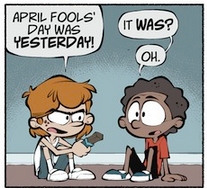CSotD: Dubious Fact-Checks
Skip to commentsI’ve learned not to bother fact-checking Frazz (AMS), though it will lead you down some fascinating wormholes. This one touched off a number of thoughts, starting out with ol’ Iron Eyes Cody, who, as Caulfield notes, was not an Indian, though he promoted the culture to an extent that at least some native groups were willing to overlook his genetic shortcomings.
The group that created that famous PSA, Keep America Beautiful, has not done quite as well in ducking the curse of “no good deed goes unpunished,” being accused of greenwashing by pushing litter as the problem, rather than the existence of discardable packaging in the first place.
I’m sympathetic, having long been opposed — however futilely — to non-refillable containers. Milk and soda bottles, O Best Beloved, were once cleaned, sterilized and re-used, and those that weren’t were genuinely recycled.
But I’m also opposed to litter, and pragmatic enough to not mind if the container-makers helped finance a program that helped cut it back, particularly since I’ve also seen them spend their money to oppose deposit laws.
I’m not only old enough to remember refillable bottles but to remember when roadsides were strewn with litter and nobody thought much about it.
I also remember my best friend and I riding our bikes to go see his girlfriend, who lived in a town 17 miles away, and that there were occasional apple trees in the woods along the road, planted there unintentionally by people who flung cores out the window.
The trick is to “fling” and not “drop” such things, so that the various critters who eat them can do so in safety.
Bill and I never came across any banana trees in our ramblings, but, then, none of the roadkill we encountered was clinging to banana peels, either. Make of that what you will.
In the meantime, we seem to have normalized trash to the point where Joe Martin overlooked the phenomenon in this Mr. Boffo.
I suppose if you challenged the fact that, even when served in the restaurant, fast food comes in paper, cardboard and plastic containers, some public relations genius would argue that washing dishes creates more environmental damage than serving food in litter.
I suppose this because among the things I’m old enough to remember is cloth diapers, and, when we expressed horror at disposables, we got a lecture about how washing diapers is worse for the environment than stuffing landfills with used disposables.
This being roughly the same time we were also being assured by the Tobacco Institute that smoking did not cause cancer.
Then Arctic Circle (KFS) comes along to — you’ll pardon the expression — muddy the waters with this joke about farmed salmon.
I generally trust Alex Hallatt’s take on environmental matters, but I am aware that “free range” for chickens doesn’t mean what it sounds like, though letting them wander around on the factory floor is probably nicer than keeping them caged. Still, if I’m going to eat something that says it’s free range, I’d like it to actually be free range.
On the other hand, I’m also aware that most city folks would be appalled if they knew what genuinely free range chickens considered edible. The saying is that you throw garbage in with the pigs and when the pigs are done eating, you let in the chickens to clean up what the pigs wouldn’t touch.
I’ve heard that freeing farmed salmon would wreak havoc on the wild population, but, in any case, I note that tuna companies have started printing “wild caught” on their cans, which clears my conscience about all those tuna farms and feedlots.
And Wumo (AMS) brings up a topic I hadn’t considered. It’s been decades since I’ve eaten swordfish, despite claims of sustainability, because you can look at the slices and see that they’re clearly catching immature sword and choking off the supply of adult fish.
But there are plenty of other fish being driven near extinction, and, as for claims of sustainability, I have long since lost track of who is honest about it and who is simply hiring unemployed Tobacco Institute experts and who used to be honest but has since sold out to Big Fish.
Though I wouldn’t be opposed to dropping some mines along the Grand Banks, if the local fishing boats could see where they were and the big trawlers couldn’t.
Wildlife does adapt, and this Other Coast (Creators) reminds me that, some years ago, I heard from the conservation folks in Maine that loons, who are normally somewhat wary about people, had discovered the joys of catch-and-release fishing.
Not that loons themselves catch and release anything intentionally, mind you, but they’d learned that people in boats do, and that the result is a large, exhausted fish swimming near the surface.
And when I checked out the story with local fishermen, they confirmed that, yes, the loons were beginning to follow them around. It’s apparently become a thing.
The specific incident that had the Department of Inland Fisheries & Wildlife laughing was a fellow in a canoe who wanted to get a photo of the wonderful trout he’d caught, but, as he held the camera and drew up the fish, ended up instead with a shot of a loon zooming up from under his canoe, snatching the fish off the line and taking off into the skies.
Feed the birds, tuppence a bag.
Still on the topic of catch-and-release, Maeve has a decision to make in Between Friends (KFS), and it isn’t about whether she should take the half-year assignment in the city of lights.
Her boyfriend already pitched a hissy over her having to cancel a weekend together for an unexpected meeting with her boss, and now he’s trying to find out if she’ll drive a spike through her career for him.
Granted, she should probably ask, “What do you think?” but only if she doesn’t already know what he thinks.
If that plane leaves the ground and she’s not on it, she’ll regret it. Maybe not today. Maybe not tomorrow, but soon and for the rest of her life.
They’ll never have Paris.
James Thurber wrote, “It’s not so easy to fool little girls nowadays as it used to be,” but, still, isn’t it strange that someone Maeve’s age could benefit by taking a lesson from Amelia in Wallace the Brave (AMS)?











Comments 7
Comments are closed.